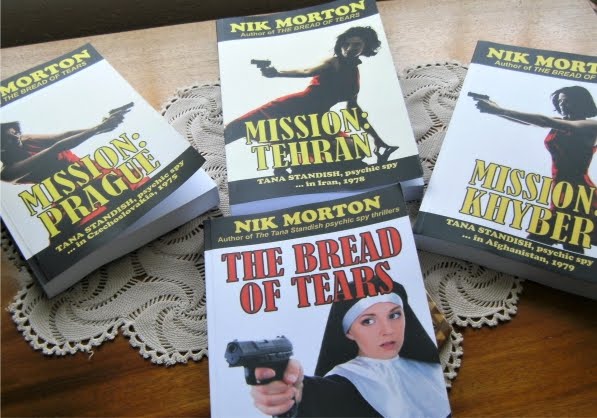THE PETITIONER
Nik Morton
David Clement, the Transport Minister, offered his best
politician's smile – a bit toothy yet still attractive. Sympathetic, but
strictly provisional. He stepped out to face the protesters, staff, press and
curious guests in the hotel lobby. A dark-haired bearded man in a red anorak
launched into an angry tirade and David overheard Mason from
The Mirror comment about ‘red rags and
bull’ but he bit back a retort and kept calm this time. David’s outburst about
speeding in built-up areas last week had made the front pages. His tenuous lead
in the pre-election polls suggested he should be more prudent as the majority
of voters drove cars and were disenchanted with the law-abiding majority being
tarred with the same brush as the reckless minority. So instead he made
mollifying sounds and absently took the offered bulging document wallet off the
man. ‘I’ll see what I can do,’ he said. His eyes hardly lingered on the irate
petitioner but peered over the man’s shoulder, drawn to the blonde woman
carrying another bundle of petitions.
She was
saying something about the need to curb speeding on the road that passed her
house. The road's name rang a vague bell, but he wasn't listening properly
because he was mesmerised by her startling light blue eyes.
There was
an earnestness in her gentle voice, with none of the usual rude shrill of
self-interest groups he normally faced. She was luminous. There was no other
word to describe her. Classic oval face, high cheek-bones, an alabaster
complexion, and those glorious big eyes - emphasised by her smart ivory-white
jacket and long pleated skirt. She didn’t seem to be the standard bimbo some
groups wheeled out to draw the attention of the television cameras to grab
extra sound-bites for their cause.
Amidst the
hubbub, the shouts of "Over here, Mr. Clement!" and flash-cameras
firing, he whispered, "What did you say your name was?"
She hadn't,
but now she said, "Sade Revenant," pronouncing it sh-ar-day reven-awn.
"What,
like the singer? What was the song?"
He missed
her answer as they were jostled apart but he caught her charming smile, cheeks
dimpling.
A few
minutes later after fielding further questions on the sorry state of the
railways, he pushed through the crowd towards Sade. "I'll talk about your
petition," he whispered, "but it's too public here - meet me at the
Trattoria - 4pm."
Strangely
elated at this rash decision, he offered the usual bromides to everybody else
then strode off with his secretary Joan trailing behind with his bulging
leather briefcases.
David was
pleased with himself. At this morning's Party Conference he roundly castigated
every transport minister since the invention of the car, bemoaning the lack of
political will over increased traffic pollution, fast cars and over-weight
juggernauts. He condemned the easy-option money-grabbing speed-traps, arguing
for sensible policing instead. The public loved it, which was more than could
be said of his fellow MPs, who were probably jealous of his current popularity.
Yet his rational side kept reminding himself: you'll be a ten-minute-wonder,
then forgotten.
***
Sade sat in a corner booth. Beside her he felt positively
dowdy in his cavalry twill suit.
"Have
you ordered?"
"No." She eyed the pile of petitions beside her on
the bench seat. "I'm not hungry."
"Oh." He tried to hide the crestfallen look on his
face. On the way he had fantasised that she might be attracted to him. Few
women were, he reminded himself, so why should she be any different? He was
considerably older than her and now at that vulnerable age where his paunch
threatened to shorten his life if he didn’t cut down on the alcohol and
fast-food.
Her glance at the petitions
reminded him of her purpose. She’d make a good politician, he thought.
Single-minded.
"Do
you want to arrange a photographer?" he asked.
"Pardon?"
She looked askance at him.
"For
the papers - you handing me the petition?" He smiled. "I won't
mind..." he ended feebly.
"No,
thank you. Just take them when you go, if that's all right, Mr. Clement."
"Fine.”
Clearly, I was being too cynical. She just wants me to take the petitions. No
ulterior motive... “I won't forget them, Miss Revenant. Is that a French
name?"
"Could
be. Call me Sade. Please."
His pulse
suddenly raced. "Sade," he repeated stupidly. Then, after faltering
for a second, he managed, "You can call me Dave."
"No,"
she said, shaking her head.
His heart sank.
"I rather like David. It
suits you."
He grinned
from ear to ear. "Can I tempt you with a coffee, some dessert? It's
awfully good, their Death by Chocolate!" So much for the paunch...
At his
words she lowered her eyes and for a fleeting second colour suffused her
alabaster cheeks. "No, thank you. Adam's ale will be fine."
"Adam's-?
Oh, yes - water." He ordered a Perrier and a glass of orange and tonic,
reluctantly forgoing the gin. Must lose
weight, he chided himself and tried not to pull a face when he tasted the
non-alcoholic drink. No gain without pain.
“No
Ordinary Love,” she said out of the blue.
“Pardon?”
“The song.
By Sade.”
“Oh, yes,
of course. I didn’t know if you’d heard.”
“I listen,
David. Do you, though?”
He felt
himself flushing under her direct scrutiny. “I try, but sometimes... well, you
know how it is...”
“I can
sympathise, David. Truly.”
“Truly?”
“Yes,
truly. Otherwise I wouldn’t be here.”
David
warmed to her. She got a divorce five years ago when her daughter Rachel was
two. She really seemed to enjoy his few anecdotes about the Corridors of Power.
She'd read many of the books he'd enjoyed – including C P Snow’s monumental
series - and disliked the same violent, foul-mouthed films he detested.
Her
petition was to reduce the speeding throughout the county, she explained, not
just her road.
Guiltily he recalled Sade's first
letter - some six months back. He'd asked Joan to spike it with the others, all
doubtless well-intentioned but too demanding on his precious time. He’d wanted
to steer clear of controversy – until today’s Party Conference, when it seemed
as though he was inspired, perhaps subconsciously recalling those spiked pleas.
She talked about her daughter – a
friend was watching over her tonight, she explained.
The place was closing when he
said he wanted to see her again.
Only too aware how intrusive the
press could be, he suggested meeting Sade in a quiet restaurant but she turned
him down. “Oh,” he said.
“No, let’s
go to the park.”
A bit
public, he thought, but shook hands on it – hers was cool and light.
As he waved
her off in the taxi, David suddenly realised that for the first time in his
life he was in love. The fact that at fifty-two he was at least fifteen years
her senior didn't matter. Amazingly, the attraction seemed mutual.
***
She was waiting for him by the lake, kneeling beside a girl
of about seven with the same hair and complexion. He hailed Sade.
“Hello,
David!” she stood, hand on the girl’s shoulder. “This is Rachel.”
He knelt on
one knee and shook the girl’s cool gentle hand. “Pleased to meet you,” he said.
“Likewise,
Mr. Clement. Would you like to feed the ducks with me?” she asked, offering him
a paper bag filled with pieces of bread.
“Yes, I’d
love to!”
They spent
an idyllic hour strolling by the lake, watching the ducks, geese and pelicans.
They were walking along Birdcage Walk when Rachel surprised him by saying, “I’m
glad they let all the birds go.”
Seeing his
confusion, Sade laughed. “Rachel’s
talking about Charles II putting an aviary along the edge here.”
“Of course.
Hence the street’s name. Silly of me,” he allowed. “I agree, Rachel, it’s much
better to see the birds flying free...”
“Free to
fly into the sky!” Rachel giggled.
“And what
would you like to do when you grow up, then? Be an airline pilot, flying like
the birds?”
“Academic,”
she mumbled, turning serious.
“Good for
you. An honourable profession, teaching.” He ignored the little girl’s puzzled
look and left them in the park to get back to work.
***
David discovered how empty his life seemed before he met
Sade and her daughter. Although he was
attracted to Sade, it wasn’t merely sexual chemistry. He’d had plenty of
dalliances – discreet but short-lived, but this was something quite different.
His
secretary Joan found him at his desk one morning, pleased with himself. "I
think this'll make a perfectly smooth and hopefully speedy journey through the House." He handed her the scribbled
Private Member's Bill.
"You've
done the poor lady proud, sir." Sitting at her computer desk, Joan smiled
sadly. "A fitting memorial to them."
His heart
lurched. "What are you talking about?"
The truth
came tumbling out. About six months ago, a week after writing her plea to him,
Sade and her daughter Rachel were hit by a speeding car and killed in her road.
"But -
but that's not possible!" He
clutched at a straw. “What did you say her name was?”
“Reveley.
Sade Reveley.”
He breathed
a sigh of relief and felt his heart start again. “That’s not her, then. Same
first name, I grant you, but my Sade is called Revenant.”
“Your
Sade?”
“A
petitioner I met.” Who also happened to
have a daughter called Rachel.
“Revenant
is a strange name, isn’t it? It sounds
French to me,” Joan observed while accessing an Internet search engine.
“Yes, I
said that too.”
“Most odd,”
she said.
“What?”
“Revenant
isn’t French...”
“Oh?” A
chilly sensation skittered down his spine. He glanced over her shoulder. The
definition was quite clear: A person who
has returned, esp. supposedly from the dead.
Somehow he
joked his way out of the discussion. Must be a mistake.
Days passed
but Sade never kept any of their usual appointments.
At night,
by himself in the lonely apartment, in his heart he knew the truth of it. The
cool touch of her hand. Always dressed in white. Her open-eyed innocence, her
tinkling laugh, her loving smile... And Rachel’s behaviour made weird sense
too. She hadn’t wanted to teach. She meant her future was academic now, because
she didn’t have one...
By some
eerie force of will Sade had shown him, ever so eloquently, what she and her
daughter had missed through being killed by a thoughtless driver - love,
laughter, tenderness, the enriching of other people's lives by their very
presence. All swept away. But, he vowed, not forgotten.
Because he
loved her and would strive to his dying day to make the roads safer.
His mouth
curved in the ghost of a smile. Like the song said, this was no ordinary love.
***
Previously published
in The New Coastal Press, 2010.
Copyright Nik Morton,
2014
If
you liked this story, you might like my collection of crime tales, Spanish Eye, published by Crooked Cat, which
features 22 cases from Leon Cazador, private eye, ‘in his own words’. He is also featured in the story
‘Processionary Penitents’ in the Crooked Cat Collection of twenty tales, Crooked Cats’ Tales.
Spanish Eye, released by Crooked Cat Publishing is available as a paperback and as
an e-book.























.png)

























